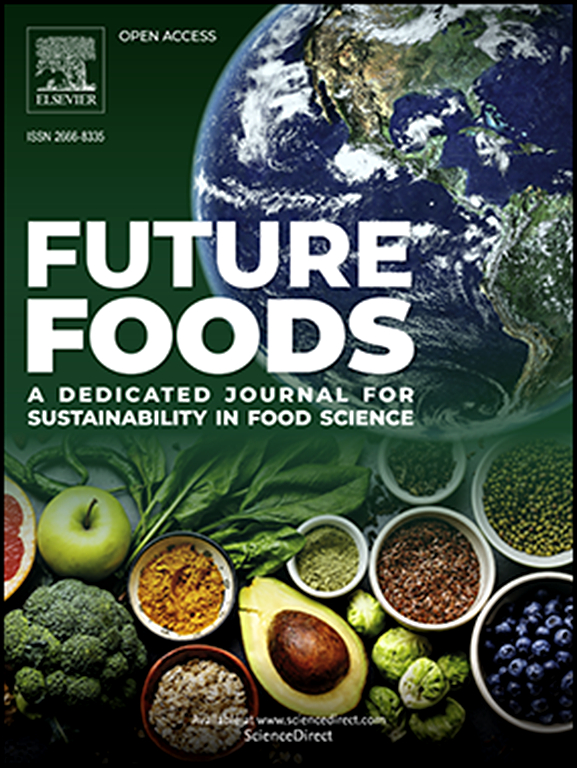Valorization of grape by-products: Insights into sustainable industrial and nutraceutical applications
IF 8.2
Q1 FOOD SCIENCE & TECHNOLOGY
引用次数: 0
Abstract
Grapes and their by-products are also considered abundant sources of protein, fatty acids, and a range of phytochemicals, e.g., resveratrol, quercetin, anthocyanins, procyanidins, catechin, kaempferol, etc. Indeed, researchers revealed several therapeutic advantages of grapes and their constituents, including the ability to fight oxidative stress, maintain heart health, lower inflammation, retard aging processes, and provide antimicrobial and blood sugar-lowering effects. Grapes and its derivatives are also being utilized in preparation of widely consumed products like wine, grape juice, raisins, fermented milk, jam etc. Owing to these benefits, its natural preservatives are gaining traction as a sustainable alternative to synthetic chemicals, contributing to cleaner and greener product formulations across industries. However, existing studies rarely emphasise all aspects of grapes and their by-products, especially its potential application in different sectors. This review integrates various new facets of grapes and their byproducts, highlighting their nutritional and phytochemical abundance while elucidating their therapeutic potential and numerous applications. By elucidating these advantages, the importance of grape derivatives and their role in fostering a healthier and more sustainable future can be emphasised. Accordingly, isolating additional bioactive compounds from grape derivatives holds significant potential to boost the economic value of grape cultivation, foster sustainability, and enhance public health through the advancement of novel therapeutic products.
葡萄副产品的增值:对可持续工业和营养保健应用的见解
葡萄及其副产品也被认为是蛋白质、脂肪酸和一系列植物化学物质的丰富来源,如白藜芦醇、槲皮素、花青素、原花青素、儿茶素、山奈酚等。事实上,研究人员揭示了葡萄及其成分的几种治疗优势,包括对抗氧化应激、保持心脏健康、减少炎症、延缓衰老过程、提供抗菌和降血糖效果的能力。葡萄及其衍生物也被用于制备广泛消费的产品,如葡萄酒、葡萄汁、葡萄干、发酵乳、果酱等。由于这些好处,其天然防腐剂作为合成化学品的可持续替代品越来越受欢迎,为各行各业的更清洁、更环保的产品配方做出了贡献。然而,现有的研究很少强调葡萄及其副产品的各个方面,特别是其在不同部门的潜在应用。本文综述了葡萄及其副产品的各种新方面,突出了它们的营养和植物化学丰度,同时阐明了它们的治疗潜力和众多应用。通过阐明这些优点,可以强调葡萄衍生物的重要性及其在促进更健康和更可持续的未来方面的作用。因此,从葡萄衍生物中分离出额外的生物活性化合物具有巨大的潜力,可以提高葡萄种植的经济价值,促进可持续性,并通过开发新的治疗产品来改善公众健康。
本文章由计算机程序翻译,如有差异,请以英文原文为准。
求助全文
约1分钟内获得全文
求助全文
来源期刊

Future Foods
Agricultural and Biological Sciences-Food Science
CiteScore
8.60
自引率
0.00%
发文量
97
审稿时长
15 weeks
期刊介绍:
Future Foods is a specialized journal that is dedicated to tackling the challenges posed by climate change and the need for sustainability in the realm of food production. The journal recognizes the imperative to transform current food manufacturing and consumption practices to meet the dietary needs of a burgeoning global population while simultaneously curbing environmental degradation.
The mission of Future Foods is to disseminate research that aligns with the goal of fostering the development of innovative technologies and alternative food sources to establish more sustainable food systems. The journal is committed to publishing high-quality, peer-reviewed articles that contribute to the advancement of sustainable food practices.
Abstracting and indexing:
Scopus
Directory of Open Access Journals (DOAJ)
Emerging Sources Citation Index (ESCI)
SCImago Journal Rank (SJR)
SNIP
 求助内容:
求助内容: 应助结果提醒方式:
应助结果提醒方式:


